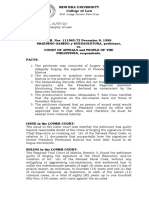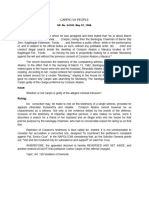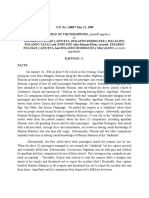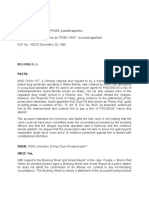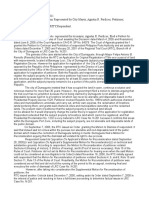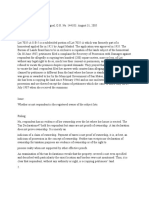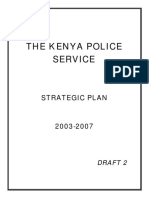Tanega V Masakayan Case Digest
Tanega V Masakayan Case Digest
Uploaded by
Meku DigeCopyright:
Available Formats
Tanega V Masakayan Case Digest
Tanega V Masakayan Case Digest
Uploaded by
Meku DigeOriginal Title
Copyright
Available Formats
Share this document
Did you find this document useful?
Is this content inappropriate?
Copyright:
Available Formats
Tanega V Masakayan Case Digest
Tanega V Masakayan Case Digest
Uploaded by
Meku DigeCopyright:
Available Formats
Convicted of slander by the City Court of Quezon City petitioner appealed.
Found guilty once again by
the Court of First Instance,1 she was sentenced to 20 days of arresto menor, to indemnify the offended
party, Pilar B. Julio, in the sum of P100.00, with the corresponding subsidiary imprisonment, and to pay
the costs. The CA affirmed the decission of the RTC and the decision became final and executory upon
the dismissal of the SC on the review on certiorari filed by the petitioner. Back to the Court of First
Instance of Quezon City, said court, on January 11, 1965, directed that execution of the sentence be set
for January 27, 1965. On petitioner's motion, execution was deferred to February 12, 1965, at 8:30 a.m.
At the appointed day and hour, petitioner failed to show up. This prompted the respondent judge, on
February 15, 1965, to issue a warrant for her arrest, and on March 23, 1965 an alias warrant of arrest.
Petitioner was never arrested.
Then, on December 10, 1966, petitioner, by counsel, moved to quash the warrants of arrest of February
15, 1965 and March 23, 1965. Petitioner's ground: Penalty has prescribed.
On December 19, 1966, the respondent judge ruled that "the penalty imposed upon the accused has to
be served", rejected the plea of prescription of penalty and, instead, directed the issuance of
another alias warrant of arrest.
Issue:
WoN the period had prescribed in the present case.
Ruling:
No, the penalty has not yet prescribed.
Arresto menor and a fine of P100.00 constitute a light penalty which prescribes in one year. The period
of prescription of penalties — so the succeeding Article 93 provides — "shall commence to run from the
date when the culprit should evade the service of his sentence".
Elements of evasion of service of sentence are: (1) the offender is a convict by final judgment; (2) he
"is serving his sentence which consists in deprivation of liberty"; and (3) he evades service of sentence
by escaping during the term of his sentence. This must be so. For, by the express terms of the statute, a
convict evades "service of his sentence", by "escaping during the term of his imprisonment by reason of
final judgment." This connotes that evasion is indeed another term for jail breaking. For prescription of
penalty of imprisonment imposed by final sentence to commence to run, the culprit should escape
during the term of such imprisonment.
In the present case, since the petitioner was never confined, the prescription of her sentence never run
in favor. Thus, her penalty has not yet prescribed.
You might also like
- Document 9Document2 pagesDocument 9mainor ordonezNo ratings yet
- Answers 3Document3 pagesAnswers 3Rocket Fire100% (1)
- People v. Kottinger - Art 201Document3 pagesPeople v. Kottinger - Art 201Ethan KurbyNo ratings yet
- Case Digest Last 3 CasesDocument2 pagesCase Digest Last 3 CasesBannylyn Mae Silaroy GamitNo ratings yet
- Richard Ciullo ComplaintDocument7 pagesRichard Ciullo ComplaintAsbury Park PressNo ratings yet
- Metro Level 2 Unit 7 Test C Two StarsDocument3 pagesMetro Level 2 Unit 7 Test C Two Starsclau pas100% (1)
- Shulz vs. FloresDocument11 pagesShulz vs. FloresKersey BadocdocNo ratings yet
- PP V Del SocorroDocument2 pagesPP V Del SocorroCandelaria QuezonNo ratings yet
- LIGUEZ v. CADocument1 pageLIGUEZ v. CAKingNo ratings yet
- Salvador vs. MapaDocument1 pageSalvador vs. MapaCherrie May OrenseNo ratings yet
- People v. RanisDocument2 pagesPeople v. RanisitsmestephNo ratings yet
- People vs. DasigDocument13 pagesPeople vs. DasigChristopher Julian ArellanoNo ratings yet
- Gamido vs. Court of Appeals, 251 SCRA 101Document2 pagesGamido vs. Court of Appeals, 251 SCRA 101Alvin D. ConstantinoNo ratings yet
- Taer v. CA 186 Scra 598Document4 pagesTaer v. CA 186 Scra 598Peter RojasNo ratings yet
- Arroyo, Jr. vs. CADocument21 pagesArroyo, Jr. vs. CAIrene RamiloNo ratings yet
- People vs. Labagala (Full Text, Word Version)Document10 pagesPeople vs. Labagala (Full Text, Word Version)Emir Mendoza100% (1)
- Herminio Buenaventura vs. People G.R. NO. 171578, AUGUST 8, 2007Document3 pagesHerminio Buenaventura vs. People G.R. NO. 171578, AUGUST 8, 2007Ines Hasta JabinesNo ratings yet
- Batulanon vs. PeopleDocument3 pagesBatulanon vs. PeopleMichelle Montenegro - AraujoNo ratings yet
- Diaz vs. Kapunan (45 Phil. 482) FactsDocument1 pageDiaz vs. Kapunan (45 Phil. 482) FactsMajorie ArimadoNo ratings yet
- Characteristics of Criminal Law: Criminal Liability (Who May Incur?) Classes of FelonyDocument6 pagesCharacteristics of Criminal Law: Criminal Liability (Who May Incur?) Classes of FelonyJohn PatrickNo ratings yet
- People V Abad The People of The Philippines Francisco M. Abad (Alias Paquito)Document4 pagesPeople V Abad The People of The Philippines Francisco M. Abad (Alias Paquito)Jujitsu AmaterasuNo ratings yet
- MELENCIO SAYO v. CHIEF OF POLICE, GR No. L-2128, 1948-05-12Document2 pagesMELENCIO SAYO v. CHIEF OF POLICE, GR No. L-2128, 1948-05-12Bobet AtendidoNo ratings yet
- Us V RastroloDocument1 pageUs V RastroloatoydequitNo ratings yet
- PEOPLE V BASAYDocument2 pagesPEOPLE V BASAYLance Bernadette BasaNo ratings yet
- Cabigas Reynes v. People, 152 SCRA 18Document5 pagesCabigas Reynes v. People, 152 SCRA 18PRINCESS MAGPATOCNo ratings yet
- Enrile v. AminDocument1 pageEnrile v. AminShiela BrownNo ratings yet
- Estepa vs. SandiganbayanDocument3 pagesEstepa vs. SandiganbayanJoyce VillanuevaNo ratings yet
- Carpio Vs PeopleDocument1 pageCarpio Vs PeopleMaricel MarananNo ratings yet
- US vs. Toribio PDFDocument3 pagesUS vs. Toribio PDFAntonio RebosaNo ratings yet
- #1 People vs. Judith PonceDocument2 pages#1 People vs. Judith PonceBernadette Pedro100% (1)
- Umil vs. Ramos - Rebellion As Continuing OffenseDocument2 pagesUmil vs. Ramos - Rebellion As Continuing OffenseAllayza Claire MacoyNo ratings yet
- 28) PP Vs GutierrezDocument1 page28) PP Vs GutierrezErnsC0% (1)
- Case Digests For SalesDocument11 pagesCase Digests For SalesJanine CastroNo ratings yet
- Group 2 For Sept 21Document4 pagesGroup 2 For Sept 21Colleen Fretzie Laguardia NavarroNo ratings yet
- People Vs Campos 202 Scra 387Document2 pagesPeople Vs Campos 202 Scra 387Clifford Tubana0% (1)
- Pil-Ey Vs PeopleDocument11 pagesPil-Ey Vs PeopleAnitoNo ratings yet
- 52 People-v-PulusanDocument3 pages52 People-v-PulusanRia Evita RevitaNo ratings yet
- Title 11 DigestsDocument3 pagesTitle 11 DigestsPatty CabañaNo ratings yet
- LOPEZ Vs PeopleDocument5 pagesLOPEZ Vs PeopleAnonymous oDPxEkdNo ratings yet
- Soria Vs Desierto DigestDocument2 pagesSoria Vs Desierto DigestJay R CastilloNo ratings yet
- Milo vs. SalangaDocument4 pagesMilo vs. SalangaEarl NuydaNo ratings yet
- People Vs SBDocument7 pagesPeople Vs SBVince Llamazares LupangoNo ratings yet
- People v. QuijadaDocument1 pagePeople v. QuijadaJan MarnieNo ratings yet
- ISRAEL - Edgar Nuque Vs Fidel Aquino and Spouses Alejandro and Erlinda BabinaDocument2 pagesISRAEL - Edgar Nuque Vs Fidel Aquino and Spouses Alejandro and Erlinda BabinaJohn Patrick IsraelNo ratings yet
- People v. AlagaoDocument3 pagesPeople v. AlagaoHenri Ana Sofia NicdaoNo ratings yet
- REM - Gonzaga vs. CA - DionisioDocument2 pagesREM - Gonzaga vs. CA - DionisioNoel DomingoNo ratings yet
- People vs. Domasian G.R. No. 95322Document4 pagesPeople vs. Domasian G.R. No. 95322strgrlNo ratings yet
- AGBAY V Deputy of OmbudsmanDocument3 pagesAGBAY V Deputy of OmbudsmanClaudine ArrabisNo ratings yet
- Jesalva V PeopleDocument9 pagesJesalva V PeopleAices SalvadorNo ratings yet
- 4 David V ArroyoDocument2 pages4 David V ArroyoBluebells33No ratings yet
- Acaac V AzcunaDocument3 pagesAcaac V AzcunaQuengilyn Quintos100% (1)
- People V ValdesDocument2 pagesPeople V ValdesFrances Angelica Domini Ko100% (1)
- 10009-Article 3 Section 12-People v. Ang Chun Kit - 251 SCRA 660Document2 pages10009-Article 3 Section 12-People v. Ang Chun Kit - 251 SCRA 660Estee XoohNo ratings yet
- People V Sope, 1946Document2 pagesPeople V Sope, 1946Leo Mark LongcopNo ratings yet
- Canta vs. PeopleDocument12 pagesCanta vs. PeopleMichael RentozaNo ratings yet
- Victoria V CA Case DigestDocument2 pagesVictoria V CA Case DigestLouNo ratings yet
- City of Dumagguete vs. Ppa DigestDocument2 pagesCity of Dumagguete vs. Ppa DigestTats YumulNo ratings yet
- Conde Vs Rivera, G.R. No. L-21741Document1 pageConde Vs Rivera, G.R. No. L-21741JNo ratings yet
- People vs. Manriquez and People vs. FabroDocument2 pagesPeople vs. Manriquez and People vs. FabroRaymundNo ratings yet
- People Vs de GraciaDocument1 pagePeople Vs de GraciaPatatas SayoteNo ratings yet
- Tanega Vs MasakayanDocument1 pageTanega Vs MasakayanBug RancherNo ratings yet
- Tanega Vs MasakayanDocument1 pageTanega Vs MasakayanClifford TubanaNo ratings yet
- Tanega v. MasakayanDocument1 pageTanega v. MasakayanKris GaoatNo ratings yet
- Property Activity 10222020Document13 pagesProperty Activity 10222020Meku DigeNo ratings yet
- Property Case Digest 09152020Document5 pagesProperty Case Digest 09152020Meku DigeNo ratings yet
- PROP1Document21 pagesPROP1Meku DigeNo ratings yet
- Accession CasesDocument95 pagesAccession CasesMeku DigeNo ratings yet
- Property 2nd BatchDocument54 pagesProperty 2nd BatchMeku DigeNo ratings yet
- Assignment GR 166102Document18 pagesAssignment GR 166102Meku DigeNo ratings yet
- Land Ti Case Digests 6th Wave (Compiled)Document39 pagesLand Ti Case Digests 6th Wave (Compiled)Meku DigeNo ratings yet
- Property-Quieting of TitleDocument57 pagesProperty-Quieting of TitleMeku DigeNo ratings yet
- Labor Notes 1st ExamDocument22 pagesLabor Notes 1st ExamMeku DigeNo ratings yet
- TH THDocument6 pagesTH THMeku DigeNo ratings yet
- Agra and SocLeg Part 2 (FULL TEXT)Document41 pagesAgra and SocLeg Part 2 (FULL TEXT)Meku DigeNo ratings yet
- Labor Notes 1st ExamDocument20 pagesLabor Notes 1st ExamMeku DigeNo ratings yet
- 2nd Wave (Land Ti.)Document39 pages2nd Wave (Land Ti.)Meku DigeNo ratings yet
- Oposa Mosqueda Case DigestDocument4 pagesOposa Mosqueda Case DigestMeku DigeNo ratings yet
- GROUP1Document103 pagesGROUP1Meku DigeNo ratings yet
- Corpo ArbitDocument26 pagesCorpo ArbitMeku DigeNo ratings yet
- Consumer ArbDocument33 pagesConsumer ArbMeku DigeNo ratings yet
- LegMed Notes 08052021Document1 pageLegMed Notes 08052021Meku DigeNo ratings yet
- Construction LawDocument93 pagesConstruction LawMeku DigeNo ratings yet
- Barangay ArbitrationDocument55 pagesBarangay ArbitrationMeku Dige100% (1)
- Case 61. PCIB Vs Escolin Full TextDocument47 pagesCase 61. PCIB Vs Escolin Full TextMeku DigeNo ratings yet
- Succession of StatesDocument2 pagesSuccession of StatesMeku DigeNo ratings yet
- Banking ArbitDocument44 pagesBanking ArbitMeku DigeNo ratings yet
- ADR IPRA CasesDocument6 pagesADR IPRA CasesMeku DigeNo ratings yet
- Legal MedicineDocument25 pagesLegal MedicineMeku DigeNo ratings yet
- Chua V CSC Case DigestDocument2 pagesChua V CSC Case DigestMeku DigeNo ratings yet
- Atp Cases 2021Document77 pagesAtp Cases 2021Meku DigeNo ratings yet
- 5 Years After WPS ArbitrationDocument2 pages5 Years After WPS ArbitrationMeku DigeNo ratings yet
- 5th Wave Additional Case FulltextDocument23 pages5th Wave Additional Case FulltextMeku DigeNo ratings yet
- Chicago Police Department Organization ChartDocument1 pageChicago Police Department Organization ChartPhilip NguyenNo ratings yet
- HKU Criminal Law Topic 4Document7 pagesHKU Criminal Law Topic 4Jane NgNo ratings yet
- English (Manish)Document18 pagesEnglish (Manish)Manish LamichhaneNo ratings yet
- SONA 2021: A Look at President Duterte's War On Drugs Five Years OnDocument5 pagesSONA 2021: A Look at President Duterte's War On Drugs Five Years Onleila goNo ratings yet
- Criminal Law and Procedure 8th Edition Scheb Test Bank 1Document17 pagesCriminal Law and Procedure 8th Edition Scheb Test Bank 1susan100% (54)
- Theories of PunishmentDocument4 pagesTheories of PunishmentHyder KhanNo ratings yet
- Alabama Executive Order - Good Time ReformDocument8 pagesAlabama Executive Order - Good Time ReformFOX54 News HuntsvilleNo ratings yet
- MarriageDocument8 pagesMarriageHAZEL CHILAGANNo ratings yet
- Application For The Renewal of A Competency CertificateDocument6 pagesApplication For The Renewal of A Competency CertificateJohan ConradieNo ratings yet
- Crime in Connecticut Annual Report 2022Document109 pagesCrime in Connecticut Annual Report 2022Editor, Hartford CourantNo ratings yet
- UNIT - 5 Individual Factors: Moral Philosophies and Values - Moral Philosophy DefinedDocument6 pagesUNIT - 5 Individual Factors: Moral Philosophies and Values - Moral Philosophy DefinedAbhishek ThakkarNo ratings yet
- EPT Reviewer With Answer Keys Part 2Document7 pagesEPT Reviewer With Answer Keys Part 2Precious Andoy-MegabonNo ratings yet
- FBI - Table 43Document1 pageFBI - Table 43eonwuka15No ratings yet
- Project Report (JATIN RAJU 21FLICHH010176)Document25 pagesProject Report (JATIN RAJU 21FLICHH010176)jatin rajuNo ratings yet
- State v. NashDocument5 pagesState v. NashSamuel RichardsonNo ratings yet
- Criminal Law 2 Final Examination 2019-2020Document9 pagesCriminal Law 2 Final Examination 2019-2020Mae Joy ArceNo ratings yet
- CSI - Chapter - 1 - IntroDocument3 pagesCSI - Chapter - 1 - IntroOwen PlatzerNo ratings yet
- Literature Review 3Document3 pagesLiterature Review 3api-534380469No ratings yet
- Giorno's Theme Jazz (Fonzi M) PDFDocument5 pagesGiorno's Theme Jazz (Fonzi M) PDFCactusToastNo ratings yet
- Power and Function of The PNP Under RDocument12 pagesPower and Function of The PNP Under RJay-r Pabualan Daco50% (2)
- Draft Strategic Plan 2003-07Document58 pagesDraft Strategic Plan 2003-07Sam ChillaNo ratings yet
- Saidulla Narsimha Bail OrderDocument21 pagesSaidulla Narsimha Bail OrderFawaz ShaheenNo ratings yet
- People Vs Mamantak - G.R. No. 174659 (Case Digest)Document2 pagesPeople Vs Mamantak - G.R. No. 174659 (Case Digest)Leah Nina Villaflores100% (1)
- CRI 121 Introduction To Phil. Criminal Justice System - EditedDocument10 pagesCRI 121 Introduction To Phil. Criminal Justice System - EditedVegan D. TeachNo ratings yet
- Philippine Rabbit V People Case DigestDocument2 pagesPhilippine Rabbit V People Case DigestAbigail Tolabing0% (1)
- People Vs LomerioDocument16 pagesPeople Vs LomeriomifajNo ratings yet
- FESTIN vs. MORFEDocument6 pagesFESTIN vs. MORFEAlyna MendozaNo ratings yet












